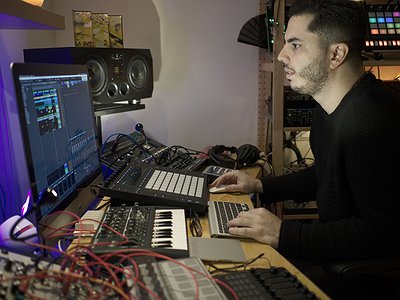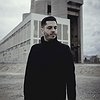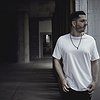How is playing live and writing music in the studio connected? What do you achieve and draw from each experience personally? How do you see the relationship between improvisation and composition in this regard?
For a while I missed the connection. I thought of making music as its own process, I thought it was self-sufficient. I’d make something I thought would please this or that DJ, that would fit this or that label or platform. But then I realised I didn’t play much of my own music, and when I did, it wouldn’t fit in with the rest of what I actually liked to play. It’s not very easy to develop a balance between fitting in with things you play and being original at the same time, and that’s where I think lies the formula of success.
I also think it’s essential to be able to play your own music, I feel much happier and whole nowadays, playing mostly my own music. I may have become a less knowledgeable DJ, but in turn I’ve become a better producer. I like being able to just go and make something specific for a moment in my DJ sets, that I know requires a certain quality or element to it, rather than buying stuff for that same purpose. I think both activities feed off each other, and the whole point of making dance music is to make people dance, and to know how to do it is to understand both reasonably well.
How do you see the relationship between the 'sound' aspects of music and the 'composition' aspects? How do you work with sound and timbre to meet certain production ideas and in which way can certain sounds already take on compositional qualities?
In my work flow both sound design and composition go hand in hand. I don’t think I can just jam without having the sounds in place. It’s hard to get musical ideas played down if they don’t correspond aesthetically to what was in my head in the first place. Maybe that’s something I had to develop being an engineer all these years, when I had to deliver a certain sound to match another person’s idea basically in real-time, in order to capture what was required.
I think it’s also something inherent with electronic music, it’s based off of sound design and micro-tuning and happy accidents. Lots of what we now consider ordinary, came from accidents from gear failure, gear limitations and so on, and to me that’s the beauty of electronic music in general, the freedom it gives us to explore textures and focus on frequencies rather than notes, as compositional tools.
Arrangement also plays a big part, working with minimal elements require a smart, dynamic use of them so things don’t get boring. I spend most of my time refining each timbre, I listen exhaustively to each part, I remove each offending frequency that can only be noticed after many listens. Sometimes, this process means changing the whole composition altogether, if I ultimately decide that it simply won’t work with a certain sound.
Our sense of hearing shares intriguing connections to other senses. From your experience, what are some of the most inspiring overlaps between different senses - and what do they tell us about the way our senses work? What happens to sound at its outermost borders?
I perceive music, and sound, as the source language, the essential most basic and true form of communication, between humans, and also nature. There’s no room for interpretation (or lack there of), it doesn’t rely on symbolism. Vibration, and energy, is essentially what everything is, and music is just that, so it speaks equally to everybody, even if you can’t hear, you experience it via the vibration.
You can see what sound does to a bowl of water, for example, and we’re made of water pretty much, so you can imagine what it does to us, on a subatomic level. It’s such a deep connection, that you often notice someone describing a sound as warm or cold, fat or juicy, I’ll even make object references - i.e. that synth is so sandy and “paperish”. These are all testaments to the fact that sound, and music, resonates with different parts of our structure and we can then associate it with multiple senses based on our previous experiences.
I’m pursuing a quest of detaching my Self from my senses, or at least from the need of feeling, tasting, hearing, seeing and judging my experiences based on my senses, and it’s helpful to use music as a tool for understanding how attached I am, and how sound and frequencies can induce certain behaviours and restrict others.
Art can be a purpose in its own right, but it can also directly feed back into everyday life, take on a social and political role and lead to more engagement. Can you describe your approach to art and being an artist?
I think art is something that speaks to you on a deep level, be it via making you think - about yourself, about itself, about a specific subject; be it via making you feel - angry, happy, bored, curious; be it via making you physically react - dance, scream, sweat, cry. To sum it up, art is completely dependent on engagement, on different levels.
Different artists have different approaches to achieving this level of connection with the audience, and/or different purposes, I try to do it through movement and euphoria, most of my work is designed to elevate your vibration in some way or another, to enhance your existence. My goal is for all of us to be free, so my music is meant to liberate the listener through different approaches, through different moods and techniques, that’s what I like to call my vision.
It is remarkable, in a way, that we have arrived in the 21st century with the basic concept of music still intact. Do you have a vision of music, an idea of what music could be beyond its current form?
I think I’ve covered it in a previous question here. Music is a pure form of communication, and regardless of any language or other forms of communication, it will prevail, as it relies on sound, which is pure energy and vibration, the primary components of existence. Any advances in technology will gravitate towards exploring our understanding and consumption of it, we always want more of it, as it’s been with the reasonably recent era of recorded music.
Instruments, in turn, started out as man’s attempts to emulate sounds from nature, and evolved into tools that would generate un-natural sounds, and became desirable on their own, and whole genres of music originated from that. You can still see it nowadays, for example with the expansion and increased accessibility of modular synthesisers, a lot of commercial music started to incorporate sounds previously exclusive to experimental sound designers, and a lot of people might be making use of it even without their knowledge, because developers started to incorporate those kinds of timbres in their commercial products, or sound libraries.
All these little interactions that happen in the background of our perception can lead to whole movements, one inharmonic frequency at a time.




